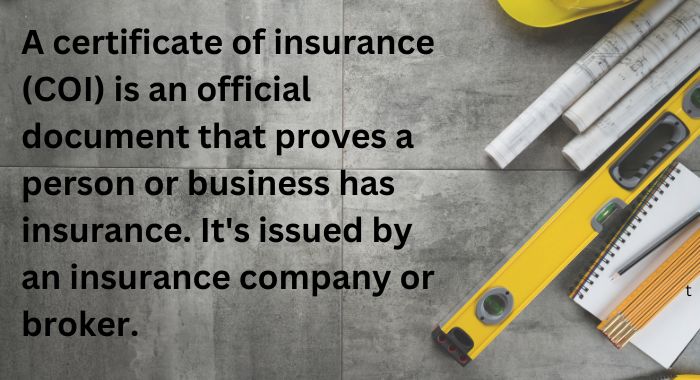
A Certificate of Insurance (COI) is an important document for anyone running a small business in Texas, hiring a contractor, or working as a contractor yourself. Whether you need proof of insurance for a Texas business or want to verify coverage from someone you hire, this article will walk you through the basics.
At the Thumann Insurance Agency—a leading Dallas insurance agency—we understand how overwhelming insurance documents can seem. That’s why we’re here to make everything as simple as possible. Below, you’ll learn what a COI is, why it matters, and how to get one quickly so you can focus on what you do best.
What’s Shown on a Certificate of Insurance?
A Certificate of Insurance serves as proof of insurance—think of it like an insurance “ID card” for your business. The standard form used to provide evidence of insurance is an ACORD Form, also known as ACORD 25. This document outlines essential coverage details, including:
-
Named Insured: The business or individual covered by the policy.
-
Types of Coverage: Policies listed on the COI can include:
-
General Liability Insurance
-
Commercial Auto Insurance
-
Commercial Umbrella Insurance
-
Workers' Compensation Insurance
-
-
Policy Start and End Dates: Shows when coverage begins and expires.
-
Coverage Limits: The maximum amount the policy will pay for claims.
-
Additional Insureds: Other parties, like a client or project owner, who are also covered under the policy.
-
Certificate Holder: The entity requesting proof of insurance. Their name and details appear on the document.
Many clients want to ensure you comply with Texas insurance requirements before working with you. Providing them with a valid **COI—especially an ACORD 25 form—**can help you earn trust, secure contracts, and demonstrate professionalism.
Why You Need a Certificate of Insurance
Having a COI is essential for small business owners, because many companies and clients won’t even consider hiring you if you can’t show proof of coverage. Meeting Texas insurance requirements helps you:
- Win More Business: Stand out among competitors by presenting valid coverage.
- Stay Protected: Avoid paying out of pocket for unexpected losses or accidents.
- Build Credibility: Demonstrate professionalism, reassuring clients that you take your responsibilities seriously.
- Meet Industry Requirements: Certain trades require a COI for compliance—this is especially relevant if you’re working under Texas contractor insurance guidelines.
How To Get Your Certificate of Insurance
Contact Your Local Insurance Agency or Broker
- If you’re insured with Thumann Insurance Agency, simply call us (972) 991-9100, drop us an email or fill out our Secure Certificate Request Form We’ll help you through the process.
-
Request Your COI
- Let us know which business insurance policy you have (like Texas contractor insurance) and who needs to be listed on the certificate.
-
Verify All Information
- Check names, coverage limits, and dates. Ensuring accuracy up front helps you avoid issues later.
-
Receive Your COI at No Extra Cost
- As long as your policy is active, there’s no charge to get a COI. We’ll send it to you promptly so you can focus on running your business.
Q&A: Your Certificate of Insurance Questions Answered
-
Who needs a COI?
- Any small business owner in Texas or contractor who’s asked to show proof of insurance, as well as anyone hiring a subcontractor or vendor.
-
How long is a COI valid?
- It’s valid as long as your business insurance policy is in effect. Check expiration dates to ensure coverage spans the entire project timeline.
-
What if a contractor can’t provide a COI?
- This is a major red flag. If they don’t meet Texas insurance requirements, you could be liable for accidents or damages.
-
Does requesting a COI cost extra?
- Typically, no. Your insurance agent will provide a COI at no additional cost if your policy is active.
Real-Life Examples & How-To’s
-
Example: A Landscaping Contractor in Dallas
- The city requires general liability insurance and proof of insurance before awarding a contract.
- Presenting a COI quickly helps secure the job and demonstrates readiness to comply with local insurance requirements.
-
Example: A Homeowner Hiring an Electrician
- The homeowner wants to ensure they’re not liable for damages.
- Requesting a COI confirms the electrician’s business insurance solutions are valid, preventing costly misunderstandings.
Common Mistakes to Avoid
- Accepting a COI That Isn’t Official: Always confirm it’s from a legitimate insurance broker or insurance provider.
- Ignoring Coverage Dates: Make sure the Texas business coverage is current and won’t expire mid-project.
- Forgetting to Check Coverage Details: Verify that limits and additional insured parties are correct to meet certificate of insurance requirements.
Your Next Step: How Thumann Insurance Agency Can Help
If you need help meeting Texas insurance requirements or would like a business insurance quote, our friendly team at Thumann Insurance Agency in Dallas, TX, is here for you. We make the process simple, ensuring you have the right coverage—like general liability insurance, workers’ compensation insurance, or Texas contractor insurance—so you can focus on running and growing your business.
Ready to learn more or request your COI? Contact us today for a free quote, personalized guidance, or to speak with a local expert who understands Texas business coverage. We look forward to helping you protect what matters most.
Thumann Insurance Agency | Dallas, TX
Your trusted partner for local insurance requirements and comprehensive coverage across the Lone Star State.

